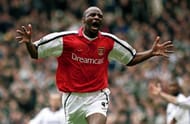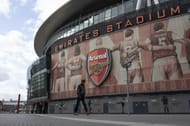Disclaimer: The views of the author do not necessarily reflect those of Sportskeeda.
"The obvious player that comes to mind is Ronaldo."
"You could imagine at the time what it would have been like to have Thierry Henry and Ronaldo together... That would certainly have changed a little bit the history of my stay here as well," a dejected Arsene Wenger revealed to the football world.
Failure in the transfer market was nothing new for Arsene Wenger and Arsenal. They had, for years, attempted to recruit some of the best up and coming talents in the world. Le Professeur was an advocate of youth from the very beginning and his scouting network unearthed several gems over the years.
However, by the late 2000s, the footballing world had caught up with the Frenchman, who would struggle to repeat his success in an ever-expanding market.
"At first, I thought: What does this Frenchman know about football? He wears glasses and looks more like a schoolteacher. He's not going to be as good as George (Graham). Does he even speak English properly?" recalled ex-Arsenal captain Tony Adams. Nevertheless, Wenger did not take long to win the admiration of players and fans alike.
The Frenchman arrived at Highbury in September 1996 after being granted his release by Nagoya Grampus. He was personally picked by the then vice-chairman of the club, David Dein, who initially wanted him to join a year earlier. The board, however, vetoed Dein's request and instead chose to appoint Bruce Rioch, who lasted a year before departing in August 1996.
Wenger's contractual obligation with Nagoya Grampus meant that Arsenal had to wait longer than expected before unveiling him to the public. Nonetheless, the club prepared for his arrival by signing French midfielders Patrick Vieira and Remi Garde before officially announcing him as their new manager on September 22, 1996.
Fans, players, and experts were initially perplexed by the Gunners' decision to appoint Wenger. However, he slowly won them over with his tactical innovations and shrewd transfer decisions. The Frenchman built his teams to play attractive football on the pitch while revolutionising their off-field preparation by enforcing a healthy lifestyle. Wenger's understanding of the transfer market further enhanced his reputation, as he helped Arsenal scout and recruit some of the best hidden talents in the world.

"Soon, one of England's most traditional and conservative footballing institutions would be transformed into a model of racial and multicultural integration. They were the first truly globalised team." wrote Jason Cowley for the Guardian while describing Arsene Wenger's early impact in England.
Wenger brought with him to England a new set of ideas with a special emphasis on youth development and data-driven recruitment. Furthermore, his vast knowledge of the African and French markets allowed him to tap into a pool of talent, unchallenged.
As much was evident from Wenger's spell at Monaco, where he had used his acumen to bring in future African greats George Weah, Victor Ikpeba, and Roger Mendy.
On the other hand, his youth-oriented approach meant that talents such as David Trezeguet, Lilian Thuram, Emmanuel Petit, and Thierry Henry were promoted to the Monegasque club's first-team.
Wenger's reputation of finding a diamond in the rough preceded him to England. Days before revealing the Frenchman as their new manager, Arsenal announced the signing of Patrick Vieira, who conceded Wenger's imminent arrival as a key factor in his transfer.
"I am delighted to be joining Arsenal at the same time as Mr Wenger becomes their coach. Being able to speak French to him will make life a lot easier for me," stated Vieira shortly after signing, as he looked to put a dismal spell in Milan behind him.
Two years later, he would complete a Premier League and FA Cup double under Arsene Wenger.

Vieira would turn out to be one of Arsene Wenger's finest signings during his time at Arsenal. The midfielder eventually ended up donning the captain's armband and playing a key role in their 'Invincible' season. When Real Madrid came calling for Vieira's services in 2004, Wenger was already prepared.
The visionary Frenchman had earmarked a rising Michael Carrick to take over from his team's captain. Vieira, however, ended up staying at the club while Carrick joined Tottenham Hotspur and later, Manchester United.
During his early years at the club, Wenger approved deals for young and talented players such as Nicolas Anelka and Freddie Ljungberg. He also made several shrewd signings - Emmanuel Petit, Marc Overmars, Lauren, Thierry Henry, Sylvain Wiltord, Sol Campbell, and Robert Pires to name a few. All of these would go on to play a key role in Arsenal's title conquests over the years.
Wenger helped his players achieve new heights personally, while also allowing them to leave the club for the right offer. Arsenal made huge profits on players such as Anelka, whom they sold for £23.5 million despite paying just £500,000 for his signature initially.
Meanwhile, the combined sale of Overmars and Petit fetched the Gunners £32 million after signing them for a combined £10 million.
A transfer policy evocative of a revolving door kept things fresh for Arsenal. Wenger, meanwhile, continued to make good use of the transfer market into the 2000s. The Frenchman sold several club stalwarts before bringing in potential stars such as the likes of Cesc Fabregas, Andrey Arshavin, Tomas Rosicky, and Robin van Persie.

"There is always something you could have done differently, but the problem of negotiations is to know when you give in and when you don't give in. Once we were at 4.5 million pounds, we were still in negotiations... so we were very close. But Man United went to 12 million pounds, which we could not afford at the time," stated Wenger, as he lifted the lid on a failed move for Cristiano Ronaldo.
By the mid-2000s Arsenal were no longer a force to be reckoned with in the transfer market. While the Gunners continued to make smart moves to bring in reinforcements, they were financially trumped by the likes of Manchester United and Chelsea. Both United and Chelsea were spending more than ever on players. Furthermore, the football world had caught up to Wenger and his scouting methods, making it more difficult for the Londoners to unearth hidden gems.
As a result of the advancements in the world of scouting, as well as the ever-growing financial strength of their competitors, Arsenal were no longer the leaders of the market. The late 2000s saw the club become a point of ridicule and their manager was relentlessly mocked for his failure to bring in good players.
For his part, Wenger continued to point the club in the right direction. The Frenchman, infamously, attempted to sign both Cristiano Ronaldo and Lionel Messi in the early part of the decade - the pair now sharing eleven Ballon d'Or trophies, But, he was let down by his club.
While the Gunners were beaten financially by Manchester United to Ronaldo, their deal to bring in Messi allegedly collapsed after failing to find accommodation for the Argentinian's family.
Passport issues scuppered Yaya Toure's move to Arsenal with the player already trialling at the club. Zlatan Ibrahimovic, on the other hand, refused to even entertain the idea of a trial and joined Ajax instead.
Later on in his tenure, Wenger unsuccessfully tried to bring blossoming talents Jadon Sancho and Paul Pogba to the Emirates, with the club unable to financially cope with their competitors.
Not all failed transfers can be pinned at the club, however. The Frenchman himself admitted missing out on the likes of Didier Drogba, N'Golo Kante, Claude Makelele, and Raphael Varane - all four playing at one point in France.
Meanwhile, the manager himself vetoed moves for Dimitri Payet, who he thought to be inconsistent, and Gareth Bale, whose potential to play in an advanced role was overlooked. Fabregas was declined a return to the club too, and the Spaniard ended up at rivals Chelsea, where he won two Premier League titles.

Arsenal's move to the Emirates in 2006 had drastic implications for the club. The Gunners had attempted to soften the blow by recouping money from player sells. However, their new stadium still ended up leaving a huge dent in their finances. The move also saw a shift in the club's transfer strategy, with Wenger prioritising the signing of youth players over 'big names'.
While the Gunners were still reeling from the effects of their move to the Emirates, they suffered another massive blow. Club's vice-chairman and minority shareholder, David Dein left in April 2007 due to incorrigible differences between himself and the board.
The Englishman had been a key figure in turning Arsenal's fortunes around in the 1990s and had himself brought Wenger to the club.
"David Dein is needed in football because this guy has revolutionised this club and also English football. He is top quality," said Wenger when addressing Dein's departure. The club's former vice-chairman's relationship with the Frenchman had been key to Arsenal's successes and his exit further affected the club's transfer business.
The transfer market too reached its saturation point by the mid-2000s, with the players now going for higher fees than ever. Arsenal suddenly found themselves handicapped in the market and were constantly beaten by their rivals to rising stars.
When the time came to assign blame for the Gunners' fall from grace, eyes turned towards Wenger, who by that point had become the face of the club.
"To all the Arsenal lovers take care of the values of the club. My love and support forever," said Wenger in his farewell note.
It's been two years since the French football manager left his post at the club. His failure to bring in bona fide stars in the latter part of his stint is fresh in the minds of fans, while his early successes seem like a millennia ago.
Nevertheless, one certain thing is that neither Arsenal nor English football would be in a position they are today if not for the man from Alsace. His eye for hidden talents gave the football world several excellent players. Also, his methods truly globalised the game in England.
Wenger's legacy lives on at Arsenal, evident by their excursions in the market since his departure. The results have been mixed of late, however, shrewd signings such as Gabriel Martinelli and Matteo Guendouzi have been unprecedented successes. The club continues to follow the policies laid down by Le Professeur decades ago, proving that he truly was a man far ahead of his time.
